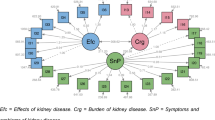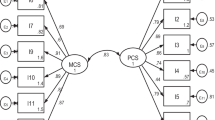Abstract
Objective: To evaluate the construct validity of the Medical Outcomes Study Questionnaire 36-Item Short Form Health Survey (SF-36) and to assess the quality of life of patients with end-stage renal disease (ESRD) at the initiation of maintenance dialysis treatment. Methods: Cross-sectional study. Setting: Eight ambulatory dialysis units in São Paulo city, Brazil. Study participants: Eighty ESRD patients at the initiation of chronic dialysis program and consecutively accepted for treatment in selected units in 1998. Main outcome measures: Quality of life as measured by the dimensions of the SF-36 questionnaire. The `Kidney Disease Questionnaire' was used in a subgroup of patients to evaluate the validity of the SF-36. Results: Median (range) scores of the SF-36 dimensions (ranging from 0 to 100, higher scores representing better quality of life) were: Physical Function 70 (0–100), Role Limitations due to Physical Problems 25 (0–100), Bodily Pain 62 (0–100), General Health 57 (5–100), Vitality 55 (10–100), Social Function 63 (0–100), Role Limitations due to Emotional Problems 34 (0–100) and Mental Health 68 (0–100). SF-36 dimensions correlated significantly with those of the `Kidney Disease Questionnaire' (correlation coefficients ranging from 0.23 to 0.68). Conclusions: The SF-36 was shown to have construct validity when used in patients with ESRD in Brazil. The quality of life of ESRD patients is impaired at the initiation of dialysis treatment and this was clearly evidenced in the Role Limitations due to Physical Function and Emotional Function items. Greater attention should be given to interventions that could improve the quality of life parameters at the initiation of dialysis treatment.
Similar content being viewed by others
References
Rettig RA, Sadler JH, Meyer KB et al. Assessing health and quality of life outcomes in dialysis: a report on an institute of medicine workshop. Am J Kidney Dis 1997; 30: 140–155.
Edgell ET, Coons SJ, Carter WB et al. A review of health-related quality-of-life measures used in end-stage renal disease. Clin Ther 1996; 18: 887–914.
Sesso R, Yoshihiro MM. Time of diagnosis of chronic renal failure and assessment of quality of life in haemodialysis patients. Nephrol Dial Transplant 1997; 10: 2111–2116.
Sesso R, Belasco AG. Late diagnosis of chronic renal failure and mortality on maintenance dialysis. Nephrol Dial Transplant 1996; 11: 2417–2420.
Churchill DN. An evidence-based approach to earlier initiation of dialysis. Am J Kidney Dis 1997; 30: 899–906.
Ware JE, Sherbourne CD. The MOS 36-Item Short-Form Health Survey (SF-36): I. Conceptual framework and item selection. Med Care 1992; 30: 473–482.
McHorney CA, Ware JE, Reczek AE. The MOS 36-Item Short Form Health Survey (SF-36): II. Psychometric and clinical tests of validity in measuring physical and mental health constructs. Med Care 1993; 31: 247–263.
Ciconelli RM. Translation to Portuguese and validation of `The Medical Outcomes Study 36-Item Short-Form Health Survey (SF-36). São Paulo, 1997; [Doctoral Thesis – Universidade Federal de São Paulo – Escola Paulista de Medicina].
Cockroft DW, Gault MH. Prediction of creatinine clearance from serum creatinine. Nephron 1996; 16: 31–41.
Laupacis A, Muirhead N, Keown P, Wong C. A disease-specific questionnaire for assessing quality of life in patients on hemodialysis. Nephron 1992; 60: 302–306.
National Kidney Foundation – Dialysis outcomes quality initiative (NKF-DOQI) Clinical Practice Guidelines. Am J Kidney Dis 1997; 30 (Suppl 2): 1–137.
Khan IH, Catto GRD, Edward N, MacLeod AM. Death during the first 90 days of dialysis: case-control study. Am J Kidney Dis 1995; 25: 276–280.
Khan IH, Garrat AM, Kumar A et al. Patients perception of health on renal replacement therapy: evaluation using a new instrument. Nephrol Dial Transplant 1995; 10: 684–698.
Meyer KB, Espindle DM, DeGiacomo JM, Jenuleson CS, Kurtin PS, Daviees AR. Monitoring dialysis patients health status. Am J Kidney Dis 1994; 24: 267–279.
Beusterien KM, Nissenson AR, Port FK, Kelly M, Steinwald B, Ware JE. The effects of recombinant human erythropoietin on functional health and well-being in chronic dialysis patients. J Am Soc Nephrol 1996; 7: 763–773.
Merkus P, Jager KJ, Dekker FW, Boeschoten EW, Stevens P, Krediet RT. The Necosad Study Group – Quality of life in patients on chronic dialysis: self-assessment 3 months after the start of treatment. Am J Kidney Dis 1997; 29: 584–592.
Guyatt GH, Vanzaten SJOV, Feeney DH, Patrick DL. Measuring quality of life in clinicals trials: a taxonomy and review. Can Med Assoc J 1989; 140: 1141–1148.
Author information
Authors and Affiliations
Rights and permissions
About this article
Cite this article
Neto, J., Ferraz, M., Cendoroglo, M. et al. Quality of life at the initiation of maintenance dialysis treatment – a comparison between the SF-36 and the KDQ questionnaires. Qual Life Res 9, 101–107 (2000). https://doi.org/10.1023/A:1008918609281
Issue Date:
DOI: https://doi.org/10.1023/A:1008918609281




